Children of Men
 for strong violence, language, some drug use and brief nudity.
for strong violence, language, some drug use and brief nudity.
Reviewed by: Joel L. Pearce, J.D.
CONTRIBUTOR
| Moral Rating: | Very Offensive |
| Moviemaking Quality: |
|
| Primary Audience: | Adults |
| Genre: | Sci-Fi Suspense Mystery Adaptation |
| Length: | 1 hr. 54 min. |
| Year of Release: | 2006 |
| USA Release: |
December 25, 2006 (limited), expanded Dec. 29 |
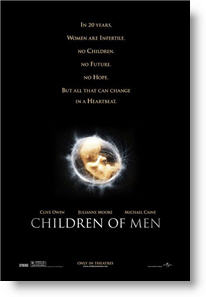
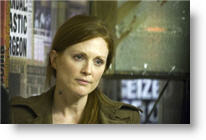
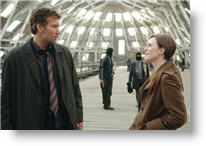
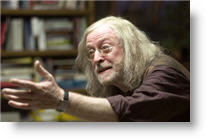
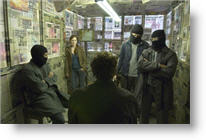
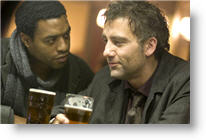
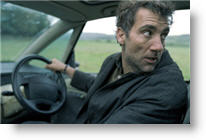
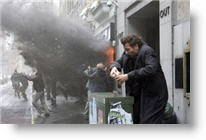
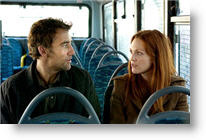

| Featuring |
|---|
| Julianne Moore, Clive Owen, Michael Caine, Chiwetel Ejiofor, Charlie Hunnam |
| Director |
|
Alfonso Cuaron |
| Producer |
| Thomas Bliss, Armyan Bernstein, Hilary Shor |
| Distributor |
“No children. No future. No hope. The last one to die please turn out the light.”
“Is it not a beautiful piece of cloth?” asked the two swindlers, showing and explaining the magnificent pattern, which, however, did not exist.
“I am not stupid,” said the man. “It is therefore my good appointment for which I am not fit. It is very strange, but I must not let anyone know it;” and he praised the cloth, which he did not see, and expressed his joy at the beautiful colors and the fine pattern. “It is very excellent,” he said to the emperor.
The Emperor’s New Clothes by Hans Christian Andersen (1837)
There are few films that I looked forward to more than this one. It’s difficult not to get excited when the cover art for the movie features an unborn child on its posters, and the trailers for the movie portray a man willing to risk everything to protect that child, even his own life. “Children of Men” had such great promise, but it was not to be.
“Children of Men” s set in London twenty years from now in the year 2027. For unexplained reasons, the rest of the world appears to be under siege, including Seattle, which, we are told in its 1000th day of its siege. We are never told why the world, including Seattle, is in conflict. As the films opens, the film’s director Alfonso Cuarón (Y tu mamá también, Harry Potter and the Prisoner of Azkaban) pans over some newspaper clippings on the wall about the war in Iraq, as if to suggest a connection between that war (in 2007) and what’s taking place in the world he has created twenty years from now, but the connection fails to materialize. I am sure most people keep twenty-year-old newspaper clippings on their walls and refrigerators.
London, the modern home of video surveillance, is the setting for the film. Sheep apparently have the run of the city as do Shelties, their herders. For unexplained reasons, the world is now barren, and it’s big news when the youngest person in the world dies at 18. Why this is big news, we haven’t a clue. The director wants us to trust him that this is important. Enter Theo (Clive Owen) a man recruited by his former lover Julian (Julianne Moore) to help her deliver some valuable cargo for the “resistance” against the totalitarian authorities. We are never told what the resistance is fighting for against the totalitarian State, or why the State is bad, except that the State has a bad policy of locking up and deporting illegal immigrants. The film maker wants us to know that he thinks that this is a very bad thing.
After Julian is killed, Theo learns that the cargo he is transporting is human cargo, namely a young, unmarried, illegal immigrant with child, and that he must help her get to the “Human Project” which is supposed to be the salvation of the world. Her name us Kee (get it, “Key” as in the key to understanding?) Is “the Human Project” real? How will the unborn child, the “hope that the whole world is waiting for”save the world? Why do we care? None of these questions are answered.
Along the journey to Human Project, Theo (the Greek word for god) battles the bad guys, saves the girl with the unborn child (which turns out to be a girl much to the chagrin of the resistance which is expecting a boy) and finally helps the mother and illegitimate child “escape” to the seas, where Theo dies. She and her baby are presumably picked up by a fishing boat named “Tomorrow,” which she believes to be the Human Project coming to rescue her and her child. Oh, and did I mention that Theo (god?) along the way is wounded in his hands, feet and side before he dies?
Timeout.
Ok. We get it. Theo is the dying god who gives his life to save the future hope of the world. “Tomorrow” represents the Ark coming to rescue the woman (who is kee/key) and her illegitimate child which presumably represent Mary and the baby Jesus. But the politically correct director wants to shake us up, so his “Messiah” is actually an illegitimate girl.
Follow me, so far?
Oh, and what about the shelties and the sheep all over the streets of London? We get that, too. The sheep represent us, humanity, who are constantly being herded by the Shelties, who represent the bad guy government authorities. Gotcha.
The problem is that this film, which is well made from a technical standpoint, just wants to preach at us and propagandize us with its particular worldview. None of our questions are ever answered—none, as if not providing any answers is a virtue. This is why I felt rather empty as the black screen finally closes the film. I felt cheated, as if there was a secret that only the initiated were in on. Consider one reviewer’s comment, “The complete lack of exposition may leave viewers thinking they haven’t understood the entire film, but that’s what makes it great.” Only the initiated are supposed to “get” this film, and some would say that this reviewer doesn’t “get it.”
Listen to the words of Hans Christian Andersen:
“I am ready,” said the emperor. “Does not my suit fit me marvelously?” Then he turned once more to the looking-glass, that people should think he admired his garments.
The chamberlains, who were to carry the train, stretched their hands to the ground as if they lifted up a train, and pretended to hold something in their hands; they did not like people to know that they could not see anything.
The emperor marched in the procession under the beautiful canopy, and all who saw him in the street and out of the windows exclaimed: “Indeed, the emperor’s new suit is incomparable! What a long train he has! How well it fits him!” Nobody wished to let others know he saw nothing, for then he would have been unfit for his office or too stupid. Never emperor’s clothes were more admired.
“But he has nothing on at all,” said a little child at last. “Good heavens! listen to the voice of an innocent child,” said the father, and one whispered to the other what the child had said. “But he has nothing on at all,” cried at last the whole people. That made a deep impression upon the emperor, for it seemed to him that they were right; but he thought to himself, “Now I must bear up to the end.” And the chamberlains walked with still greater dignity, as if they carried the train which did not exist.
The problem with “Children of Men” is the emperor has no clothes. It carries itself like the vain pompous emperor who said, “Now I must bear up to the end.” Watching the film lumber to its end, I thought of how the “the chamberlains walked with still greater dignity, as if they carried the train which did not exist.” What could have been a great film, was instead a waste of time, money and talent. The language, the brief nudity and violence which were present within this film, were not enough for me to disqualify the movie, but the lack of a coherent storyline, the mind-numbing plot, the arrogance of the director with his politically correct worldview, left me feeling insulted and shorted by his “vision.”
Humanity and “human projects” are not the hope for fallen and brutal humanity. God had a human project 2000 years ago, through the Incarnation. The One who became flesh, and is alive forever is the true Ark by which we must be delivered. All others pretending to be messianic are but pretenders. This one won’t even qualify as a rental. We get it.
Violence: Extreme / Profanity: Extreme / Sex/Nudity: Moderate
See list of Relevant Issues—questions-and-answers.


As far as the film being pro-illegal immigration goes, I didn’t take it that way, whatever the filmmaker’s intent. Granted, the government used repressive means to stop immigration (including, though the reviewer seems not to have realized this, mass execution and ghettos), but, on the other hand, the biggest villains in the film seemed to be the immigrant terrorists. On this matter, the film didn’t seem to “preach,” it simply presented what was happening in this dystopian future. With the outside world collapsed and there being no young population anymore (that’s why the death of the world’s youngest person was upsetting symbolically), obviously there was no capacity in Britain to take on unlimited immigrants. But that doesn’t make the government methods attractive. Looks to me like something to debate after the film.
As commented by others there was a lot of use of the “f-word” by the hero, Theo (Clive Owen) (By the way, the filmmaker does not describe him as a Jesus figure but as a Moses figure), who is portrayed as a morose figure with no hope in the beginning of the film; but later he behaves with great heroism. Theo’s old hippie friend, Jasper (Michael Caine), is shown using some form of drug. There are no sexual situations, but there is violence and some shocking moments. But it’s a serious, thought-provoking film by a brilliant film maker that is worth seeing. I think it’s one of the most interesting of 2006, from a Christian perspective as well as a pure aesthetic one. It’s also worth noting that the film is based on a book by a Christian author, P.D. James.
Offensive / 4½
Offensive / 4½
As a Christian, I found the message in this movie to be extremely uplifting and true to the Christian spirit. In the midst of the decay of human society, faced with the end of humanity altogether, hope is found and born (literally). This reviewer seems stuck on small details and their significance, trying to find preachiness where there is none, and all the while missing the greater picture presented. I would recommend this film to anyone looking for an extremely well-made movie that also works as a strong metaphor for the hope and charity that we, as Christians, cherish and live by. Never mind the nonsensical notions of only the “initiated” getting it. Just pay attention to what the filmmakers present you with, and try being a grown-up and deducing the film’s message for yourself. That is what makes it a truly remarkable piece of art, as well as a monument to some of Christianity’s most basic principles.
Average / 5
Similarly, its certainly an obtuse observation to not know why Baby Diego is so important, the youngest person in a world with no children, of course he would become a celebrity. Links to the Iraq war are made because the world we are creating now is the world the will be tomorrow. And the Iraq war irrevocably changed the future. We are watching the children of today. These are the children of men the title refers to, the offspring of our vanities and greed. The world we are leaving for posterity, riddled with war, intolerance and environmental degradation will undoubtedly look like the world in “Children of Men.”
Good / 5
Second, the film was pretty violent, but so is real life, and so is, definitely, the Bible (e.g. when Samuel “hacks King Agog to pieces” in front of the king of Israel). The difference between a film like this, and a film like the “Die Hard” films is that this film does not promote violence, either as a good answer to a solution, or for pure sensationalism and voyeurism for the audience to view. It presents the violence as realistic, and creates a scary atmosphere to draw us into sympathizing with the dangerous plight of the protagonists.
The brief nudity was not offensive to me either, as it was not erotic, and served a definite purpose. I am not here to defend artistic nudity, which is a touchy subject among many Christians these days, but I would ask: would you consider nudity in classical art as offensive and morally wrong, such as Michelangelo’s David sculpture? Do you consider it morally wrong to view un-erotic pictures of nude or semi-nude aborigines in National Geographic magazine, or photos of dead nude bodies from the Holocaust of WWII? If you do, that’s your prerogative. But I must say that although the Bible does condemn physical lust, there are certain situations when the naked human body might not always be sinful to view. If you were a doctor, would you shield your eyes every time a patient disrobed in front of you? Probably not. A mature and thinking Christian should be able to distinguish between nudity that is designed for entertainment and exploitation, and nudity that is designed to be viewed platonically, unemotionally, and with a purpose to the story.
…I think that the film can be interpreted according to many different ideologies and points of view, and was not a clear endorsement of or attack on any of them. …I did not feel that it was either denying or rejecting the Christian worldview, but merely presenting a thoughtful and beautiful hypothetical, “what-if” story from a simply human point of view, detached from all religious thought and purpose. In short, “Children of Men” is a beautiful and thoughtful film that any mature, thinking Christian should feel free to view, in my opinion.
Good / 5
The film is laudable from a Christian perspective because it epitomizes a number of Christian values-compassion, faith, honesty and self-sacrifice. Yes, there’s lots of foul language and violence. The film depicts a violent, chaotic world because the world we live in is violent and chaotic; if anything, it demonstrates that Christian principles are more important than ever in times of extreme hardship and despair. At least one character (Miriam, the midwife) regularly turns to God to ask for help in difficult situations. (When the bus is stopped on the way into Bexhill, and boarded by a soldier, she’s dragged off the bus and shot because she refuses to stop praying.)
As far as the “agenda” of the film is concerned (immigration, pro-life issues, government brutality, etc), I’d argue that there isn’t one. It certainly depicts a brutally repressive and anti-immigrant government, but I don’t think that (that aspect of the film at least) is a direct comment on the immigration situation in the United States today. (Also, no matter what your views are on the subject, I think we can all agree that, illegal or no, the treatment of immigrants in the film was thoroughly un-Christian).
Overall, I’d say this was a great film because of the extremely high level of technical sophistication, Christian ideals, superb acting, and raw emotional power. Not for the young ones though: extremely violent and disturbing. A must see.
Better than Average / 5
The story is beautiful. The story is also believable. How far-fetched is it to think that, unless world events change for the better, that war will be completely worldwide? How far is our own country from the reality of concentration camps for illegals (And don’t think people aren’t suggesting it… cuz they are)? It hits close to home.
The religious imagery is strong, almost pervasive. Especially near the end of the film. As the mother and child and their protector pass through crowds of people, the people stop crying and reach out to touch the one who very well may be the savior of mankind. When soldiers see the baby they scream for a cease fire and some seem to find faith again. There is peace when the child enters the turmoil of a war-torn world. But then, as with all of us, a loud noise distracts them and they all begin fighting again.
If you want an artistic film that touches on the most important issues of our day (the sanctity of the unborn, war and peace, immigration, prejudice, nationalism, religion, God) then this is the film for you. It deals with some tough issues and asks some hard questions (When Theo’s “mate,” as Kee calls her, dies, the midwife tries to tell him about her God and Theo tells her to stop talking and he asks, “Where is God’s big plan in that?”). And unless we’re willing to deal with the hard questions and the controversial and hard issues, we can never be the Church that our Father who is in heaven would want us to be.
Average / 5
Offensive / 2½
Offensive / 3½
Due to this post-Christian resistance to explicit Christian themes, I think our culture has been seeking out the Spirit of Christ elsewhere, outside the distrusted conventional realm of the Church and the highly contested battleground of the Bible.
As a Christian who recognizes (and sympathizes with) reactions to suspicious agendas and ulterior motives in searching out the Christ, Joseph or Mary figures in “Children of Men,” it seems less threatening to me to first look at themes of the story that are common to all people, and then explain why it is that these Christian elements come to mind while watching the film. The author of the book on which the film is based is a professed Christian who was obviously influenced by her faith in writing the book. The film’s director came out saying he was not especially trying to put a Christian message on the big screen. Having said this, between the two creators there is a societal tension at work. One has a faith from which the story issues de facto, and the other serves no faith agenda, yet acknowledges the important common human message of the story.
It seems to me the only common denominator for all people, Christian and non-Christian, is to identify the common raw ideas in the story. But does this mean Christians should settle for a common denominator by allowing the “raw human ideas” to stand without having the especially revelatory agent of Christ? If Christ is truly the fullness of God and the unifier of all human concerns, then Christians should strive to explain and demonstrate why these raw, disparate themes concerning the human condition should converge in Christ.
There are many important and relevant themes in Children of Men. No doubt issues of racism, classism, and immigration are treated thoroughly. One theme that stands out to me and hit me on a personal level is that of man’s nature to propagate violence, so much so that violence results even when trying to accomplish peace. The title of the film’s reference to “children of men” and not to the more gender inclusive “humans” speaks to male brutality. Universal concepts of hope and trust stand out as even more overarching themes in the film.
Although the dominant themes of male aggressiveness and female pacifism are based on dangerous stereotypes, there is still great truth in what the two genders represent. Going further into the theme of the chaotic and aggressive ways of men, we can see the contrasted idea of women being the controlled and quiet influence that is characteristically maligned and subverted in favor of its brassier and more demonstrative alternative. The idea of hope always assumes a distance and the absence of something better. And the dire circumstances surrounding humanity in the story are met with a hopeless frustration that works itself out in an insecure male power struggle.
Whether or not one wants to attribute the violent and nonviolent ways of humanity to males and females respectfully, these are very common human realities nontheless. So then how does a Christian respond to such realities? Even deeper than the blatant similarities to the Christian nativity stories of Matthew and Luke are the ideas of hope and trust mentioned above. But how can a person have hope or learn to trust in anything in a post-apocalyptic dystopia? The solution to these main themes of hopelessness and distrust is the idea of nonviolence. Nonviolence offers a way of demonstrating a trust in humanity’s gentler ways to get us through life. Nonviolence offers a way of demonstrating hope that such ways will win out in the end. Jesus taught the ways of nonviolence as foundational to his ministry, and he lived it out (Matthew 5). He exemplified how the subtly pervasive Spirit of God conquers the loud and destructive ways of humanity. It was the firm yet peace ful example of Jesus that eventually overcame the violence of Roman law and a corrupt Jewish political system. Although different rebel groups at the time of Jesus each had their own militantly calculated response (Zealots and other revolutionary movements), the quiet Kingdom ways of Jesus ultimately overwhelmed the cacophonic ways of the world.
This is one of the many difficult paradoxes of the Kingdom. Everyday we are being inundated by messages of violence and alerted to the harsh ways of human problem-solving. We are told we must fight violence with violence. In order to counteract this powerful influence of dealing with the world on equal terms we need to give audience to Jesus and his peaceful ways. We need to offset our society’s negative messages with Jesus’ positive one. It is precisely because the way of the Kingdom is so counterintuitive and non-rational that we need the constant reminder of the peaceful ways of the Gospel.
This film can help us take a closer look at the cycle of violence in our world. The failure of war as a means to resolve international conflicts in recent history is leaving a fresh impression of the problems associated with taking aggressive and retaliatory measures too hastily. As a result, a number of inspired works have come about to get this message across. Such projects like Children of Men will hopefully turn our attention to the peaceful ways of Jesus and help us all see how trust and hope in a Greater Reality are more effective modes of dealing with the problems of the world. Instead of resorting to human schemes with “calculated risks” and “collateral damage,” we can learn to look more closely at the unassuming and gentler ways of a child. And if we look long enough until the disbelief falls away like scales from our eyes, we can present the world with a hope that’s easier to believe in.
Better than Average / 4½
Very Offensive / 2½
Offensive / 3
Extremely Offensive / 3
I think in order to like this movie you would have to totally buy into the characters and script. I can’t see how anyone could do this unless you want to fantasize about the apocalyptic future based on one persons view. I find these kinds of (“Mad Max,” “Waterworld”) try to create something so impossible that it just seems shallow and corny. If you think about epics that are set in a certain time frame they can work because even though it takes a lot of time the art department can create a realistic PORTRAYAL for example Roman times. (“Gladiator,” “Ben Hur”… etc.) These worlds seem real because they are based on history and nothing new needs to be invented. The opposite is always true of futuristic. Just think of all the thousands of individuals who devote a lifetime to invent and create new technology, cell phones, televisions, a whole host of new car designs and building architecture. I use these examples because futuristic require their art department, consisting of perhaps a few hundred individuals, to not only create these new worlds but also invent new technology, vehicles and architecture trying to condense the genius and multiple years of design into a few short months all the while expecting an interesting end result. I find the result to be a movie that tries to sell itself using quirky gadgetry (the young man at the dinner table) poorly design ugly cars (take your pick) (the future decided to have standards again??) and instead of architecture we just get destroyed everything which is so much easier to create than any kind of design. (even left over in a destroyed world rather than smashed busses and garbage everywhere). As far as the script goes it is so… so dumb. …My point is if you have a lackluster script with no explanation of the story and a pointless ending you have a very lackluster, uninformative, pointless movie. Did I mention pointless?
Offensive / 1½
The film is very violent. This becomes one of the film’s greatest strengths as the violence is not glorified in any way (very unusual in a modern film). The explosions hurt your ears, the wounded cry out in pain, etc. In short, you get to see what violence is really like: and it is horrible. Ultimately, I think it is impossible to come away from this film without a pacifist message (which, I would remind you, is a Christian message, regardless of your political beliefs).
The most objectionable part of the film is some (very brief and non-sensualized) nudity. This lasts for perhaps 2 seconds and is, as I said, un-erotic. Only the most sensitive people would be offended by it. If you are one of them, the solution is quite simple: either do not go, or close your eyes when one of the characters begins to disrobe.
I must take issue with the alleged symbolism that the reviewer pointed out. First, I think the Christian symbolism he mentions is rather stressed. Second, if I grant that symbolism, I do not think there is any reason to view it as warped. You can interpret this as a (stretched) Christian story, or as just a story with good morals. The protagonists in it demonstrate self-sacrifice, a belief in something greater than themselves, loyalty and courage. The villains show bloodlust, greed and corrupted ideals. In the end, the villains are destroyed by their own schemes, while the heroes escape to a new, hope-filled future.
Finally, some have criticized the film for being leftist, or having pointlessly inserted Bush-bashing. There are some clippings on walls criticizing Bush, and yes, they are from 2007. However, in the film’s chronology, that is about when the infertility plague started, so people might very well keep these clippings (and you are far more likely to find an anti-Bush quote nowadays than a pro-Bush one).
Good / 4½
Offensive / 5
Extremely Offensive / 1
1. Entertainment: 9.25 out of 10
2. Directing: 9 out of 10
3. Acting: 8 out of 10
3. Score: 7.5 out of 10
4. Cinematography: 9.5 out of 10
5. Visual effects: 8.75 out of 10
6. Sound effects: 9.5 out of 10
7. Editing: 9.25 out of 10
Average / 4½
Offensive / 3




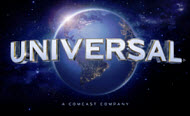
The visual film-making from director Alfonso Cuaron is nothing short of breathtaking. Often in some very brutal ways. From the very first scene, he creates and immerses us into a totally new world. In the interest of not ruining the experience, I will simply say that there is an extended sequence that forms the film’s climax—one extended shot—that is the most viscerally effective moment in any movie since the opening of “Saving Private Ryan.”
The acting is… mostly good. Clive Owen is great, and since he carries the film, that’s a very good thing. there is a scene in which an important moment of his life is discussed. He doesn’t speak, not a word, but the camera hovers around him as he reacts. It is all right there on his face, not a second overplayed. He is an actor who is not praised enough for his range of abilities. It’s true that his work certainly lends toward the dark, but he brings such a humanity (and often a vulnerability) to his wounded characters, offering the audience a chance to understand a group of men who could easily be mistaken as utterly cold-hearted or calloused.
The film is a journey film, literally and of course metaphorically. For me, the metaphor went a little bit far, but still ultimately worked (although I question the necessity of the ending) The action sequences are both unique and alarmingly bold. And yes, they are violent. There is a very quick bit of nudity, as well as some hard-earned profanity.
The film is undeniably political, and kind of preachy. It shows a Britain that has closed itself off from the rest of the world, and which is totally intolerant of any foreigners. And while it is of course clear that the government got wildly carried away, I also think it is somewhat understandable, given the fact that literally the entire rest of the world is being torn to pieces. There would be loads of precautions to make sure that the last standing country remains so. No, it doesn’t absolve the government, but it’s not as cold and hateful as Cuaron would like to make it. To his credit, though, he doesn’t allow the “rebels” to be pure-hearted freedom fighters. In many ways, they are just as bad, as when Theo points out their own bombings and killings. The film is far from perfect, but the visual brilliance of Cuaron, the redemptive themes throughout, and the acting of one Clive Owen (and small props to Michael Cane and Danny Huston) make it easily worth seeing.
My Ratings: Average / 4